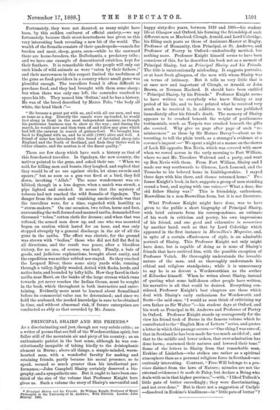PRINCIPAL SHAIRP AND HIS FRIENDS.* As a discriminating and just,
though not very subtle critic; as a writer of poems that are full of the Wordsworthia,n spirit, but fuller still of the mountain air and piety of his country; as an enthusiastic patriot in the best sense, although he was con- .stitutionally incapable of taking kindly to the Aristophanic element in Burns ; above all things, a simple-minded, warm- hearted man, with a wonderful faculty for making and retaining friends, partly because his moral presence, so to speak, seemed so much greater than his intellectual per- formance,—John Campbell Shairp certainly deserved a bio- graphy, and a sympathetic one. But it ought to have been-one- third of the size of the volume that Professor Knight here gives us. Such a volume the story of Shairp's uneventful and
• Principal Shairp and his Friends. By William Knight, Professor of Moral Philosophy in the University of St. Andrews. With Portrait. London: John Murray. 1888. happy sixty-five years, between 1819 and 1885—his student life at Glasgow and Oxford, his forming the friendship of such different men as Macleod, Clough, Arnold, and Lord Coleridge, his filling such posts as those of Assistant-Master at Rugby, Professor of Humanity, then Principal, at St. Andrews, and Professor of Poetry in Oxford—undoubtedly merited, but nothing more. Professor Knight himself seems to have been conscious of this, for he describes his book not as a memoir of Principal Shairp, but as Principal Shairp and his Friends. The title is unintentionally misleading. It suggests portraits, or at least fresh glimpses, of the men with whom Shairp was on terms of intimacy. But it tells us very little that is at once new and important of Clough, or Arnold, or John Brown, or Norman Macleod. It should have been entitled "Principal Shairp, by his Friends." Professor Knight seems to have written to everybody who knew Shairp at any period of his life, and to have printed what he received very much as he received it, in addition to what was published immediately after his friend's death. The memory of Shairp appears to be crushed beneath the weight of posthumous testimonials, much as Tarpeia was crushed beneath the gifts she coveted. Why give us page after page of such " re- miniscences " as these by Sir Horace Davey P—about as in- teresting, to tell the plain truth, as a stranger's evidence at a coroner's inquest :—" We spent a night at a manse on the shores of Loch Eil opposite Ben Nevis, which was covered with snow when we rowed across in the early morning to Fort William, where we met Mr. Theodore Walrond and a party, and went up Ben Nevis with them. From Fort William, Shairp and I made our way southwards to Glencoe, Loch Lomond, and the Trosachs to his beloved home in Linlithgowshire. I stayed three days with him there, and thence returned home." Pro- fessor Knight's book, in fact, suggests a group of men standing round a bust, and saying with one voice,—" What a dear, fine old fellow Shairp was 1." This is friendship, enthusiasm, Boswellism in a non-Boswellian form, but it is not literature.
What Professor Knight might have done, was to have given to the public a short biography of Principal Shairp, with brief extracts from his correspondence, an estimate of his work in criticism and poetry, his own impressions of his friend, and one good and exhaustive in memoriant by another hand, such as that by Lord Coleridge which appeared in the first instance in Macmillan's Magazine, and, in spite of a certain effusiveness of style, is an admirable portrait of Shairp. This Professor Knight not only might have done, but is capable of doing as is none of Shairp's friends that have outlived him, with the possible exception of Professor Veitch. He thoroughly understands the loveable nature of the man, and as thoroughly understands his ethical and religious standpoints ; while it is unnecessary to say he is as devout a Wordsworthia,n as the author of Silmahoe himself. When he writes about Shairp, instead of quoting what some half-dozen other people have written, his narrative is all that could be desired. Everything con- sidered, Professor Knight's best chapters are those which deal with Shahp's early enthusiasm for Wordsworth and Scott—(he said once, "I would as soon think of criticising my own father as Sir Walter ")—his student days at Oxford, and his work as Principal in St. Andrews and Professor of Poetry in Oxford. Professor Knight stands up courageously for the view his friend took of Burns in the famous volume which he contributed to the "English Men of Letters "series, and quotes a letter in which this passage occurs:—" One thing I was sure of, that in Scotland he has been made far too much an idol of; and that to the middle and lower orders, that over-admiration has done harm; coarsened their natures and lowered their tone." Some of the letters to Shairp from that remarkable man, Erskine of Linlathen—who strikes one rather as a spiritual atmosphere than as a personal religious force in Scotland—are curiously interesting. Contrast, "Free-Will belongs to a pro- vince distinct from the laws of Nature; miracles are not the external evidences ci la mode de Paley, but declare a Being who deals with us in that higher province,"—with, " Hiked Tulloeh's little pats of butter exceedingly; they were discriminating, and not over-done." But is there not a suggestion of Carlyle —dissolved in Erskine's kindliness—in "little pats of butter" P


















































 Previous page
Previous page